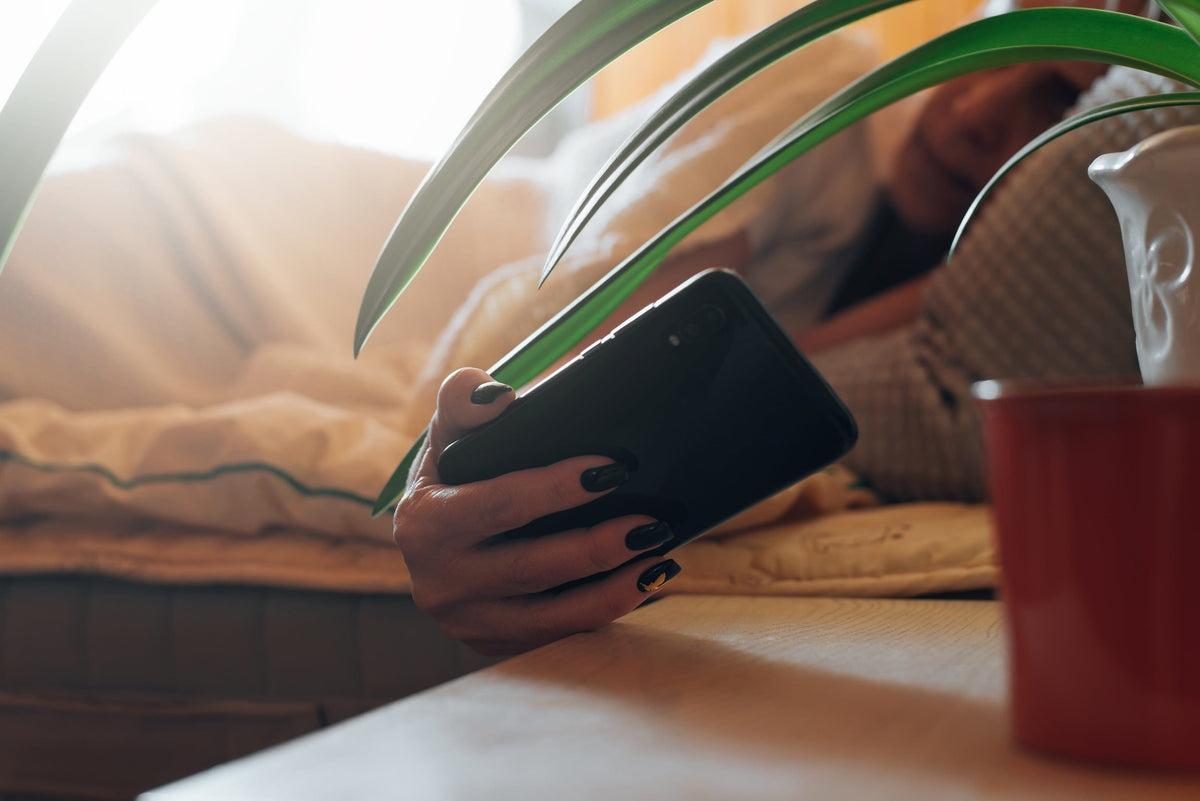For many women in midlife, getting a “good night’s sleep” may feel like they’re chasing a mirage.
Night sweats and sleeplessness experienced during menopause already disrupt rest; now daylight savings may add yet another hurdle to getting a full, restful night's sleep during menopause and beyond.
Whether changing hormones or clocks are to blame, research shows there are ways you can help your body find a new rhythm. Let’s dive into this more, below.
How Does Daylight Savings Impact Menopause and Sleep?
Nearly half of all women report difficulties sleeping in the years leading up to menopause.1
While there is a combination of variables at play, night sweats and sleeplessness due to mood disorders—like anxiety or depression—commonly interfere with sleep in menopause.2 Studies also show that estrogen, a hormone that becomes volatile and then drops significantly throughout menopause, helps to regulate our body’s internal clock and sleep-wake regulator—aka, our circadian rhythm.3,4,5
It should come as little surprise that women in menopause—whose circadian rhythms may already be out of whack—might be especially sensitive to the impacts of daylight savings.6 Although findings are conflicting, some studies even suggest daylight savings may pose a risk to heart health.7,8
Fortunately, there are ways to start adjusting sleep after daylight savings, according to research.
Adjusting Your Sleep After Daylight Savings
Here are some methods sleep experts say might help you better adjust to the time change and get better rest.
Shift Bedtime in Preparation
It turns out that one particular method, often recommended by sleep experts for adjusting baby nap schedules, may also work for adults.
If you know your sleep schedule is going to change over the weekend, do your best to prepare throughout the week by shifting your bedtime—earlier or later, depending on fall back or spring forward—by 20 minutes each night.9 By the time you’re ready to shift your clock, your body should be more adjusted to the time change.
Stay Active—But Not Too Late
There’s solid scientific evidence that exercise helps women fall asleep quicker and sleep more soundly.10 But there’s one caveat: exercising too late in the day may have the opposite effect.11
To fully leverage exercise as a tool in better sleep, do your best to avoid exercising too close to bedtime and finish physical activity at least two hours prior to rest.12 Sleep experts say even 30 minutes of moderate aerobic exercise—like powerwalking, strength training, yoga, or swimming—can improve sleep quality that very night.13
Sync Up with the Sun
Remember the circadian rhythm and its importance in your body’s readiness for sleeping and waking that we mentioned earlier? It turns out our circadian rhythms are in close sync with the sun, which means safe, intentional light exposure at specific times of the day may just be a hack to adjusting to daylight savings time.14
Once the time change hits, try going outside into the sun for 20 minutes as soon as it’s light outside.15 If you’re adjusting to “fall back,” do your best to wake up at the new time and spend time in well-lit rooms of your house to signal to your brain that the day has started. Sitting by a window with the blinds open is a good start, but natural light is best, according to research.16
Once you’re winding down for bed, keep the house dim and dark. While light exposure helps to speed up the circadian rhythm at the beginning of the day, too much sun or light near the end of the day may negatively impact sleep.17,18
Tweak Your Diet to Support Sleep
Most women are aware that eating well benefits many aspects of health. Sleep quality is no exception: what you consume throughout the day may make a huge difference to how fast—and how soundly—you sleep.19
As you adjust to sleep during menopause through time changes, also consider the following nutrition tips to support good sleep: 20,21
- Have your last meal or snack at least a few hours before bed.
- Avoid spicy, acidic, or heavy foods close to bedtime.
- Avoid caffeine (coffee, tea, sodas, energy drinks) close to bedtime.
- Avoid, or at least limit, alcohol, which may negatively impact restorative stages of sleep.
- Consider a diet rich in lean protein, complex carbohydrates, and heart-healthy fats to foster good sleep.
- Incorporate foods rich in magnesium, a mineral associated with improved sleep quality. Think spinach, nuts, seeds, avocados, black beans, chicken, seafood, and whole grains.22
For more tips on how to improve sleep during menopause, check out this quick clip from Bonafide Chief Medical Officer, Dr. Alyssa Dweck:
Talk to Your Healthcare Provider About Sleep Issues
Sleep is a critical component of health through menopause and beyond. If you have trouble adjusting your sleep after daylight savings, consider reaching out to your healthcare provider. A physician can guide you on proper sleep hygiene or, in severe cases, prescribe medication that may help your body adjust to the time change.
Resources
- https://www.sleepfoundation.org/women-sleep/menopause-and-sleep
- https://www.nia.nih.gov/health/menopause/sleep-problems-and-menopause-what-can-i-do
- https://my.clevelandclinic.org/health/articles/circadian-rhythm
- https://www.nature.com/articles/s44294-025-00057-z
- https://gennev.com/learn/when-hormones-meet-time-changes-how-menopause-affects-your-sleep-cycle/
- https://gennev.com/learn/when-hormones-meet-time-changes-how-menopause-affects-your-sleep-cycle/
- https://newsroom.heart.org/local-news/washington-heres-your-wake-up-call-daylight-saving-time-may-impact-your-heart-health
- https://medschool.duke.edu/news/daylight-saving-time-may-not-trigger-heart-attacks-after-all-study-finds
- https://www.balance-menopause.com/menopause-library/coping-with-the-clock-change/
- https://www.hopkinsmedicine.org/health/wellness-and-prevention/exercising-for-better-sleep
- https://pmc.ncbi.nlm.nih.gov/articles/PMC10411382/
- https://www.hopkinsmedicine.org/health/wellness-and-prevention/exercising-for-better-sleep
- https://www.hopkinsmedicine.org/health/wellness-and-prevention/exercising-for-better-sleep
- https://www.npr.org/2025/03/09/nx-s1-5320160/time-change-daylight-saving-spring-health
- https://www.npr.org/2025/03/09/nx-s1-5320160/time-change-daylight-saving-spring-health
- https://pubmed.ncbi.nlm.nih.gov/36058557/
- https://med.stanford.edu/news/all-news/2025/09/daylight-saving-time.html
- https://health.clevelandclinic.org/light-night-can-interfere-sleep
- https://www.sleepfoundation.org/circadian-rhythm/how-to-prepare-for-daylight-saving-time
- https://www.sleepfoundation.org/circadian-rhythm/how-to-prepare-for-daylight-saving-time
- https://www.hopkinsmedicine.org/health/wellness-and-prevention/better-sleep-3-simple-diet-tweaks
- https://www.healthdirect.gov.au/foods-high-in-magnesium








